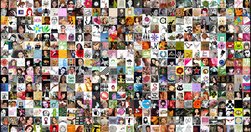Filter 1422 resources:
- disinformation (252)
- media (230)
- news (230)
- content strategy (195)
- social media (165)
- journalism (153)
- facebook (137)
- curation (137)
- storytelling (103)
- blogging (83)
- psychology (79)
- video (78)
- content (76)
- audiovisual (64)
- ai (63)
- community (61)
- native advertising (57)
- factchecking (55)
- us2020 (54)
- blog (53)
- filter bubble (50)
- algorithm (49)
- semantic (49)
- longform (48)
- tool (48)
- content marketing (48)
- cognitive (46)
- medium (39)
- data journalism (39)
- bloggingportal (39)
- eu (38)
- promotion (38)
- trump (37)
- audience research (36)
- productivity (36)
- design (35)
- twitter (33)
- multilingualism (32)
- science (32)
- podcast (31)
- trust (31)
- politics (31)
- myhub (29)
- visualisation (28)
- publicsphere (28)
- data (27)
- augmented reality (26)
- authenticity (26)
- visual (25)
- innovation (25)
- seo (25)
- newsletter (25)
- online architecture (24)
- covid19 (24)
- atprotocol (23)
- conspiracy (22)
- linkedin (21)
- backfire effect (21)
- strategy (20)
- communications (20)
- data visualisation (18)
- science journalism (18)
- explainer (17)
- google (17)
- enewsletter (17)
- mobile (17)
- science communication (17)
- realtime (17)
- democracy (16)
- infographic (16)
- virtual reality (16)
- advertising (16)
- identity (16)
- bot (16)
- knowledge management (16)
- comments (16)
- us (16)
- censorship (16)
- polarization (16)
- ux (15)
- delegitimise (15)
- metrics (14)
- interactive (14)
- crowdsourcing (14)
- information (14)
- engagement (13)
- llm (13)
- clickbait (13)
- messaging (13)
- stream (13)
- gtd (13)
- personal (12)
- digital transformation (12)
- post-truth (12)
- tv (12)
- web design (12)
- nytimes (12)
- bloggingportal2 (12)
- propaganda (12)
- fediverse (12)
- instagram (11)
- confirmation bias (11)
- troll (11)
- machine learning (10)
- animation (10)
- viral (10)
- persuasion (10)
- 2ndbrain (10)
- gds (10)
- k4p (10)
- media literacy (9)
- brexit (9)
- business model (9)
- creativity (9)
- image (9)
- atomisation (9)
- russia (9)
- domestic (9)
- faq (9)
- cms (9)
- ec (9)
- newsroom (9)
- nlp (9)
- instant articles (8)
- yanss (8)
- livestream (8)
- 360video (8)
- evidence-based policy (8)
- bluesky (8)
- cards (8)
- ea (8)
- platform (8)
- (8)
- narratives (8)
- information architecture (8)
- qanon (8)
- ocm (8)
- marketing (8)
- outreach (7)
- participation (7)
- editorial (7)
- startup (7)
- groupthink (7)
- pr (7)
- app (7)
- circa (7)
- event (7)
- privacy (7)
- top3pods (7)
- bbc (7)
- blogpocalypse (7)
- vote (7)
- internal communications (7)
- open web (7)
- machine translation (7)
- buzzfeed (7)
- organisation (7)
- collective intelligence (7)
- html5 (7)
- search (7)
- regulation (7)
- cambridge analytica (7)
- web (7)
- tribe (6)
- theme (6)
- deep fake (6)
- persona (6)
- policy (6)
- b2b4me (6)
- substack (6)
- web20 (6)
- chat (6)
- sceptic (6)
- vox (6)
- climate (6)
- chatgpt (6)
- bias (6)
- wikipedia (6)
- truth (6)
- signaltonoise (6)
- slack (6)
- bestof2015 (6)
- suppress (6)
- analytics (6)
- euractiv (6)
- blogger (6)
- antivaxxer (6)
- quartz (5)
- blockchain (5)
- brand (5)
- memory (5)
- hate (5)
- hoax (5)
- facebook live (5)
- uk (5)
- sponsored content (5)
- headline (5)
- vine (5)
- gender (5)
- usa (5)
- open source (5)
- technology (5)
- europa (5)
- google+ (5)
- screencast (5)
- basic (5)
- decentralised (5)
- zettelkasten (5)
- activitypub (5)
- framework (5)
- obsidian (5)
- atprotocol lexicon (5)
- standard.site (5)
- ethics (4)
- leaflet (4)
- api (4)
- machine text (4)
- context (4)
- collaboration (4)
- management (4)
- knowledge visualisation (4)
- optimisation (4)
- europe (4)
- education (4)
- free speech (4)
- brussels bubble (4)
- snapchat (4)
- apple (4)
- credibility (4)
- guide (4)
- help (4)
- politicoeu (4)
- tools (4)
- youtube (4)
- futurism (4)
- publishing (4)
- guardian (4)
- solutions journalism (4)
- moderation (4)
- presentation (4)
- influence (4)
- fbpaper (4)
- inoculation (4)
- humour (4)
- portal (4)
- blm (4)
- gpt-x (4)
- corporate journalism (4)
- moments (4)
- magazine (4)
- dissonance (4)
- responsive (4)
- bullshit (4)
- sublime (4)
- echo chamber (4)
- disruption (3)
- tourism (3)
- rebelmouse (3)
- ai4communities (3)
- logo (3)
- faceted search (3)
- paper (3)
- expert (3)
- campaign (3)
- survey (3)
- example (3)
- jeff jarvis (3)
- populism (3)
- ai prompt (3)
- writing (3)
- wiki (3)
- social marketing (3)
- gif (3)
- agile (3)
- meaning (3)
- personalisation (3)
- infowar (3)
- explanatory (3)
- intranet (3)
- lobby (3)
- misinform (3)
- change (3)
- debunk (3)
- hr (3)
- euractiv-com (3)
- automation (3)
- live (3)
- signal2noise (3)
- themes (3)
- semanticweb (3)
- eurosceptics (3)
- andy matuschak (3)
- memex (3)
- powerpoint (3)
- transparency (3)
- bundle (3)
- research (3)
- history (3)
- roamresearch (3)
- outrage (3)
- ui (3)
- whitewind (3)
- multimedia (3)
- annotate (3)
- transmedia (3)
- coda (3)
- gamification (3)
- mvp (3)
- blogactiv (3)
- tumblr (2)
- comics (2)
- mobocracy (2)
- local (2)
- mastodon (2)
- wisdom (2)
- crowdfunding (2)
- scicomm (2)
- crm (2)
- conference (2)
- law (2)
- spambot (2)
- culture (2)
- hoaxy (2)
- share (2)
- library (2)
- trending (2)
- slideshow (2)
- authoritarianism (2)
- interface (2)
- fomo (2)
- amp (2)
- copyright (2)
- risk (2)
- notification (2)
- meme (2)
- atlantic (2)
- computational propaganda (2)
- counter speech (2)
- mooc (2)
- radio (2)
- slideshare (2)
- future (2)
- homepage (2)
- plagiarism (2)
- atavist (2)
- tag (2)
- pitch (2)
- keyword (2)
- buffer (2)
- training (2)
- nuzzle (2)
- river4 (2)
- china (2)
- seenthis (2)
- infopocalypse (2)
- open science (2)
- australia (2)
- aggrefilter (2)
- iot (2)
- audio (2)
- meerkat (2)
- eparltv (2)
- goals (2)
- photography (2)
- scraping (2)
- planning (2)
- fivethirtyeight (2)
- mediafr (2)
- surveillance (2)
- attentionweb (2)
- drupal (2)
- taxonomy (2)
- usp (2)
- postmodern (2)
- skills (2)
- colour (2)
- backlink (2)
- social (2)
- mybot (2)
- curatorbot (2)
- osmo (2)
- learn (2)
- prezi (2)
- opencalais (2)
- ltinnovate2016 (2)
- ngo (2)
- bookmark (2)
- interoperability (2)
- post-alpha (2)
- alpha phase (2)
- hosted (2)
- data4policy (2)
- balance (2)
- pluralistic ignorance (2)
- fear (2)
- reality (2)
- understanding (2)
- society (2)
- pink slime (2)
- sequoia (2)
- flicc (2)
- report (2)
- product/market fit (2)
- sensemaking (2)
- euroblog (2)
- project management (2)
- learning (2)
- syndicated-translation (2)
- excalidraw (2)
- massive.wiki (2)
- digital garden (2)
- mermaid (2)
- usability (2)
- sari azout (2)
- motivated (2)
- reflectivity (2)
- dunning-kruger (2)
- pay4content (2)
- desirability (2)
- lean canvas (2)
- perplexity.ai (1)
- routine (1)
- slidecast (1)
- nat eliason (1)
- meeting (1)
- egov (1)
- digg (1)
- gmo (1)
- wikitribune (1)
- economics (1)
- networking (1)
- dark forest web (1)
- bioethics (1)
- leadership (1)
- psychometrics (1)
- genetic (1)
- nasa (1)
- citizen journalism (1)
- city (1)
- election (1)
- ep (1)
- binggpt (1)
- game theory (1)
- lofi (1)
- wef (1)
- gov2.0 (1)
- journal (1)
- react (1)
- free (1)
- startupy (1)
- energy vampire (1)
- mindfulness (1)
- apathy (1)
- storyboard (1)
- roi (1)
- define (1)
- emily m bender (1)
- egovernment (1)
- impact (1)
- raf (1)
- version control (1)
- adaptive content (1)
- bingchat (1)
- hive (1)
- cardsort (1)
- trove (1)
- compositional (1)
- hbr (1)
- eptv (1)
- ntopic (1)
- specialist (1)
- ello (1)
- liveblogging (1)
- bard (1)
- boredom (1)
- freelancer (1)
- wikileaks (1)
- shieldlaw (1)
- shortform (1)
- ai-image (1)
- nsa (1)
- adobe (1)
- fail (1)
- ai reasoning (1)
- vr (1)
- content partnership (1)
- ai-agent-gpt (1)
- yahoo (1)
- open government (1)
- conversation (1)
- abtesting (1)
- voice (1)
- brain (1)
- glass (1)
- evolution (1)
- spectacles (1)
- happeningo (1)
- calendar (1)
- archive (1)
- ipad (1)
- experiment (1)
- length (1)
- cpms (1)
- rdf (1)
- linked data (1)
- ukraine (1)
- eeas (1)
- smo (1)
- claude code (1)
- upshot (1)
- tabloid (1)
- knowledge illusion (1)
- cory doctorow (1)
- mindhack (1)
- chinese (1)
- upworthy (1)
- rationality (1)
- venue (1)
- python (1)
- periscope (1)
- joan westenberg (1)
- civil rights (1)
- seeding (1)
- expiration (1)
- governance (1)
- values (1)
- publicsector (1)
- consultancy (1)
- oecd (1)
- enshittification (1)
- template (1)
- geo (1)
- white papers (1)
- quiz (1)
- snowden (1)
- kickstarter (1)
- workflow (1)
- trello (1)
- game (1)
- chipotle (1)
- schema.org (1)
- simon willison (1)
- competition (1)
- newsana (1)
- newscred (1)
- muckread (1)
- pinterest (1)
- eurocrap (1)
- belgium (1)
- circa2 (1)
- compass news (1)
- letters2eu (1)
- mojo (1)
- supergirl (1)
- garden (1)
- business (1)
- dikw (1)
- euro (1)
- gpt-4o (1)
- napkin ai (1)
- messenger (1)
- vlog (1)
- public affairs (1)
- broadcast (1)
- co-creation (1)
- language technology (1)
- idpi (1)
- italy (1)
- renee diresta (1)
- ugc (1)
- primal (1)
- dell (1)
- stanbol (1)
- apache (1)
- scrollytelling (1)
- epale (1)
- multisite (1)
- embodiment (1)
- rationalisation (1)
- programme (1)
- snowfall (1)
- pilot (1)
- roaming (1)
- eesc (1)
- anthropomorphic (1)
- ifttt (1)
- diigo (1)
- video editing (1)
- google glass (1)
- dellhell (1)
- chinese room (1)
- green (1)
- blogosphere (1)
- disgustology (1)
- data void (1)
- hololens (1)
- ebook (1)
- anthropocentric (1)
- mapping (1)
- eu09vs19 (1)
- word2vec (1)
- conversational (1)
- expertise (1)
- solr (1)
- micro.blog (1)
- posse (1)
- greengale (1)
- indieweb (1)
- “illusory (1)
- digital civility (1)
- reversal curse (1)
- bookmarklet (1)
- elaboration (1)
- aspire (1)
- bluesky custom feeds (1)
- justin garrison (1)
- category (1)
- saas (1)
- geopolitics (1)
- presseurop (1)
- neural link (1)
- power (1)
- geofence (1)
- sociology (1)
- blackpr (1)
- truth psychology (1)
- cofoe (1)
- insurrection (1)
- yeats (1)
- comparison (1)
- threadapalooza (1)
- gatsby (1)
- homophily (1)
- biased assimilation (1)
- assimilation (1)
- sill (1)
- data portability (1)
- philippines (1)
- euvsdisinfo (1)
- false enforcement (1)
- syllabus (1)
- wikinews (1)
- cmv (1)
- scarcity (1)
- physics (1)
- english (1)
- lobbying (1)
- philosophy (1)
- imposter syndrome (1)
- yanns (1)
- markdown (1)
- design thinking (1)
- goodwill (1)
- negativity bias (1)
- intro (1)
- unreality (1)
- credible exit (1)
- reddit (1)
- circuit-breaker (1)
- delusion (1)
- humility (1)
- cui bono (1)
- peace data (1)
- information laundering (1)
- empathy (1)
- commonplace (1)
- eaststratcom (1)
- ipr (1)
- halo (1)
- plandemic (1)
- honesty (1)
- damien van achter (1)
- ginsburg (1)
- laurens hof (1)
- section230 (1)
- omission (1)
- participatory culture (1)
- splinternet (1)
- fleeting (1)
- gab (1)
- planetary (1)
- scuttlebutt (1)
- trust net (1)
- hxc (1)
- web development (1)
- early adopter (1)
- bridge (1)
- bridgit (1)
- it (1)
- tiktok (1)
- european (1)
- addiction (1)
- spaced repetition (1)
- deplatform (1)
- ghost (1)
- mental health (1)
- discord (1)
- arg (1)
- plato (1)
- metaverse (1)
- label (1)
- flipboard (1)
- fedwiki (1)
- uncategorized (1)
- storyful (1)
- vancouver2026 (1)
- slow news (1)
- framing (1)
- ideation (1)
- cluetrain (1)
- big data (1)
- fascism (1)
- rebuttal (1)
- cosmik (1)
- bxlsbbl (1)
- storyline (1)
- lisp (1)
- yellow-card (1)
- complex (1)
- specialised (1)
- illusory (1)
- life-in-belgium (1)
- eparticipation (1)
- atproto adoption (1)
- information-architecture (1)
- map (1)
- team (1)
- comment (1)
- notion (1)
- reading queue (1)
- online (1)
- think (1)
- argdown (1)
- middleware (1)
- feed (1)
- mixed reality (1)
- filter (1)
- polbot (1)
- peakbot (1)
- basecamp (1)
- truthbuzz (1)
- ft (1)
- happiness (1)
- knowledge graph (1)
- radicalisation (1)
- integrated (1)
- pkm (1)
- liquid democracy (1)
- experience (1)
- metaphor (1)
- whatsapp (1)
- documentary (1)
- viber (1)
- apple news (1)
- upday (1)
- samsung (1)
- adblock (1)
- emergingus (1)
- sidewire (1)
- po.et (1)
- webgl (1)
- 3d (1)
- line (1)
- syndication (1)
- ontology (1)
- semble (1)
- procrastination (1)
- music (1)
- 3p framework (1)
- smartcities (1)
- autonomous (1)
- jobtodo (1)
- bitcoin (1)
- text (1)
- d3 (1)
- cx (1)
- assist (1)
- wapo (1)
- storymapjs (1)
- monetisation (1)
- speech to text (1)
- playbook (1)
- partnership (1)
- transcript (1)
- longreads (1)
- mediumform (1)
- streamplace (1)
- theoretical physics (1)
- einstein (1)
- agora (1)
- statistics (1)
- agriculture (1)
- flancian (1)
- sovereignty (1)
- essena (1)
- fakebox (1)
- europcom (1)
- service (1)
- inscrutable (1)
- trade (1)
- npr (1)
- open data (1)
- polls (1)
- user (1)
- soonfeed (1)
- twitter migration (1)
- knowledge panel (1)
- gander (1)
- guidelines (1)
- eurosceptic (1)
- pressrelease (1)
- fuego (1)
- remote (1)
- listicle (1)
- autosummarise (1)
- rss (1)
- ios (1)
- freedom (1)
Relevant Overviews
Overview: Content Strategy
Are you creating the content your audience actually wants to consume, or are you just talking about yourself?
What sort of content will your audience read, out of the endless supply at their fingertips? Formal news articles or blog posts from your staff and readers? An event calendar updated daily, or a longread every month? Static web pages, or a deeply granular database with faceted search?
And have you figured out how to get it to them, develop engagement around it, and translate that success into something concrete, fulfilling your mission? How many of the friends and organisations in your network amplify your message regularly?
Need answers? Get in touch.
More services: start with Communication strategy.
Relevant resources
"The real question isn't why we don't read anymore, it's why we comment—passionately and with the utmost confidence—after reading only a headline. " - NPR Pulled a Brilliant April Fools' Prank On People Who Don't Read
We wanted to see where Americans think Ukraine is and to learn if this knowledge (or lack thereof) is related to their foreign policy views

Neat visualisation - could be relevant for EEAS. "Political scientists Kyle Dropp, Joshua Kertzer, and Thomas Zeitzoff asked 2,066 Americans to find Ukraine on a map. Then they asked what the US should do in Ukraine. "We wanted to see where Americans think Ukraine is and to learn if this knowledge (or lack thereof) is related to their foreign pol…

And not just journalists. New generation news sites are redefining news and, by consequence, rethinking information architecture, content strategy and CMS. I only hope the results filter through to everyone else, and sooner rather than later. "... a moment when young talent began demanding superior technology as the key to producing superior jour…
A new generation of companies, like CIRCA, are redefining the structure of how information is treated, and building new CMS to support it. Their approach will inevitably feed into a new generation of CMS for whom the 'article' and 'page' are, if not meaningless, at least optional. And I for one can't wait. "what we’re really doing at Circa is a…
"It’s hard to fake being useful. You have to know what you’re doing, from your strategy all the way through your execution. But when useful content is so important to your credibility, it’s hard to justify anything less. ... How do you make content useful? ... craft it with users’ real needs, decisions, and questions in mind" Insight 2 from resea…

Social media 101 perhaps, but worth sharing: "So what can you do to improve your SMO strategy and start generating some positive social signals that will produce powerful results for your business or brand? ...: - Reputation – building a strong reputation online that will have visitors viewing you as a trusted, reliable source. - Engagement …

Maybe the EC should focus on being useful online, rather than being trendy on Facebook? From the ever-good Digital Tonto: "Brands need to become publishers [who] begin with an editorial mission ... [so] stop thinking about content and start thinking about what you have to offer the world ... stop thinking about promoting and start thinking in te…

There are more good recommendations in here than can be summarised, but if I had to choose one, it's: "Integrate the developers and editors, from where they sit to whom they report to. If you’re going to do social journalism well, you’re becoming a technology platform company... Almost all the important breakthroughs in social media have come fro…
"we're expanding LinkedIn's publishing platform and testing a new feature that lets members write longer form posts about their expertise and professional interests. Posts are shared with your network and the LinkedIn community, and become a part of your LinkedIn profile. " - LinkedIn's Publishing Platform - Overview | LinkedIn Help Center A…

Good perspectives on the limits of audiovisual content re-use: "editor-in-chief of NowThis News ... stressed the need for publishers to create content on a platform-by-platform approach ... bearing in mind the wider context of how content is shared on different networks." In reality, this is no different from text content re-use. You don't necess…

"data-driven journalism doesn’t simply strive to contribute to public policy and culture debates, it aims to end them with a decisive answer. ... In Actually Journalism, news and opinion aren’t needed; to understand something, all the audience needs is this fact, this piece of data, this answer... [but] if Actually Journalism can’t find a way to e…
Ice Caves with a drone-mounted GoPro. I’ve got a Gopro, so maybe it’s time to get a drone… via mashable
Perils and pitfalls of augmented reality …
"He says that his goal is to capture the readers attention like these [clickbait] articles, but then get them to interact, think about, share, and meaningfully engage with the content. " - 2014: The future of content marketing - an interview with Brian Solis - Technorati Business

A tour of upcoming innovations in "Explanatory journalism... will play a larger role in the digital media landscape ..." illustrate a wider trend: “... content-centric start-ups getting funded. ... web and mobile publishing platforms still present new opportunities for new entrance, new publishers, new journalists, new publications...” - 'FiveTh…
Surprised that after a week this only has about 500 views. Vox.com should be one of the top tech-first news innovators to watch this year

Surprise surprise... "Circa is developing two types of ads: magazine-style full-screen banners, like Flipboard, and sponsored posts... which look and feel like editorial, created by a separate staff.... One future revenue possibility would be licensing access to Circa's article data to other publishers," - News App Circa Looks to Native Ads for Fi…
Excellent overview of a complex topic. Makes me think that a lot of EU communications could benefit hugely from reframing itself as "non-profit news", and considering these questions in depth. Alas, the only interesting debate in this field seems to be limited to the US. "The value of online and offline audience engagement is a question that bot…
Looks like one kind of newspaper has a long future - the worst kind: "Supermarket tabloids have long been an icon of unreliability, largely because of their outrageous claims and sensational, melodramatic design. But when individual pieces are shared via social media, these visual and context clues are typically stripped out... Without this conte…

Is data journalism just another opportunity to bamboozle an audience? Surely publishing the data in interrogable form would be the answer? "data give commentary a false sense of authority since data analysis is inherently prone to bias. The author’s priors, what he believes or wants to be true before looking at the data, often taint results that …

A pretty good idea of where news & journalism will be in 5 years, or deja vu all over again? "the organizations worth backing must be run by tech savvy, top-notch people focused on social distribution of stories that serve an existing but underserved niche audience. ... “They are all technology companies first ... understand how people utilize t…
"when you figure something out that's not trivial ... you're wasting it on Twitter or Facebook. ... The mission of blogging is to empower all of us to go directly to each other with our expertise. So if you know something as well as anyone else, or you learn something or know something that should be shared, then you should share it on your blog. …
When the keyboard loses its connection every few minutes, the screen flips upside down and you can’t enter anything into online form. Eventually they refunded me... after seeing this video.
"“In the old days, the few big newspapers were so profitable they could run desks on most of the most important issues in the world. Now, as the news landscape fragments, investigative journalism often takes place in nonprofits... " - Upworthy partners with ProPublica and advocacy media groups on original content » Nieman Journalism Lab
@Poynter's piece seems fair. While it's true that "rebundling of news is booming. New aggregation sites with a social media twist, led by BuzzFeed, are working ingenious variations on the first wave like The Huffington Post..." ... and that if everyone in the world had a smart phone and an iPad, the global news market will grow rather than shri…

Applies equally to projects, where for step 1 (quoted below) the focus should be the project's USP: "Define what exactly your company is, its motto and the sole purpose of its existence. Write down everything that you think your company/website is about. Is it about marketing tips, social media, mobile apps, etc.? Define the existence of your com…
Well, plus ca change - absolutely none of the things some BloggingPortal editors said we'd do after our meeting in January have been done, apart from our own posts and what Stefan did, which is ironic given that he told us he had no time to do anything.
"a new model for digital-first audio programming ... a collective, helping to market one another, providing guidance on technical issues, and sharing lessons on growing audiences. Radiotopia will provide the framework for raising money..." - Welcome to Radiotopia, a podcast network with the aesthetics of story-driven public radio » Nieman Journal…
FalseA German journalist and camera crew have fun with the EP gravy train in “Scandale au Parlement Européen : Argent facile, champagne à gogo et autres privilèges. This sort of film iseasy to make and so becoming commonplace. And people in the Brussels Bubble wonder why they are not so widely loved elsewhere?
Loading more...